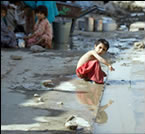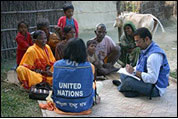Frequently Asked Questions
1) What are human rights?
 Human rights are rights inherent to all human beings, without distinction as to race , colour, gender, language, religion, political or other opinion, national or social origin, property, birth or other status. All human rights, whether they are civil and political rights, such as the right to life, equality before the law and freedom of expression; economic, social and cultural rights, such as the rights to work, social security and education, or collective rights, such as the rights to development and self-determination are indivisible, interrelated and interdependent. The improvement of one right facilitates advancement of the others.
Human rights are rights inherent to all human beings, without distinction as to race , colour, gender, language, religion, political or other opinion, national or social origin, property, birth or other status. All human rights, whether they are civil and political rights, such as the right to life, equality before the law and freedom of expression; economic, social and cultural rights, such as the rights to work, social security and education, or collective rights, such as the rights to development and self-determination are indivisible, interrelated and interdependent. The improvement of one right facilitates advancement of the others.
Universal human rights are expressed and guaranteed by law, in the forms of treaties, customary international law, general principles and other sources of international law. International human rights law lays down obligations of Governments to take positive action in certain ways or to refrain from particular acts in others, in order to promote and protect human rights and fundamental freedoms of individuals or groups. More…
2) What does the United Nations do in promoting and protecting human rights?
The promotion and protection of human rights is one of the fundamental goals of the United Nations, which works actively in defining, helping implement, and monitoring international human rights standards. The General Assembly, for example, has since 1948 adopted some 80 human rights conventions and declarations. The Office of the United Nations High Commissioner for Human Rights (OHCHR) has lead responsibility for the promotion and protection of human rights, and for implementing the human rights programme within the UN. It has been given a unique mandate by the international community, through the General Assembly, to do so.
Human rights mechanisms established by the UN, such as the Human Rights Council and numerous bodies of independent experts, in their capacity as members of the core human rights treaty bodies or special rapporteurs with thematic or country - specific mandates, monitor the implementation of human rights standards worldwide. Judicial organs in the United Nations family, such as the International Criminal Court, and specialized criminal tribunals, such as the ones for former Yugoslavia and for Rwanda, established by the Security Council, work to ensure justice in cases of gross human rights violations. More…
3) How does OHCHR work?
 OHCHR, staffed by over 900 international civil servants who work on a wide range of human rights activities, is headed by High Commissioner for Human Rights Zeid Ra'ad Al Hussein since September 2014. The independent role of the High Commissioner as the principal UN human rights official comes from a separate mandate by the General Assembly.
OHCHR, staffed by over 900 international civil servants who work on a wide range of human rights activities, is headed by High Commissioner for Human Rights Zeid Ra'ad Al Hussein since September 2014. The independent role of the High Commissioner as the principal UN human rights official comes from a separate mandate by the General Assembly.
OHCHR supports the United Nations human rights mechanisms, such as the Human Rights Council, the Special Procedures and the expert committees monitoring international human rights treaties. With a number of field presences, it assists Governments in strengthening their human rights capacities, promotes ratification and implementation of international human rights treaties. The Office works with Governments and other partners such as national institutions to ensure all human rights are fully respected. OHCHR engages with civil society organizations to assists them in promoting and protecting human rights more effectively.
To fulfil its comprehensive human rights mandate, OHCHR speaks out objectively in the face of human rights violations worldwide. It provides a forum for identifying, highlighting and developing responses to today's human rights challenges worldwide, and acts as the principal focal point of human rights research, education, public information, and human rights advocacy activities in the United Nations system. More…
4) What is the Human Rights Council? Is it different from OHCHR?
The Human Rights Council, established on 15 March 2006 by the General Assembly and reporting directly to it, replaced the 60-year-old United Nations Commission on Human Rights as the key United Nations intergovernmental body responsible for human rights. The Council , consisting of State representatives, is a primarily political body with a comprehensive human rights mandate, and a forum empowered to prevent abuses, inequity and discrimination, protect the most vulnerable, and expose perpetrators.
The Human Rights Council is a completely distinct entity from OHCHR, which is part of the United Nations Secretariat answering to the Secretary-General. OHCHR provides technical, substantive and secretariat support to the Council. More…
5) How do I get information about OHCHR and its activities?
 The website of OHCHR is a good source of information about OHCHR and the United Nations human rights system. You can find there information on OHCHR, its structure, activities and latest news, different human rights issues, international human rights law, human rights bodies such as the Human Rights Council and the treaty bodies. You can also find human rights information on most countries, such as, their status of ratification of international human rights treaties, their cooperation with OHCHR and special procedures such as independent experts, Governments' reports on their implementation of the core international human rights treaties, and recommendations on state reports by the treaty bodies. You may also contact OHCHR headquarters in Geneva or its field offices.
The website of OHCHR is a good source of information about OHCHR and the United Nations human rights system. You can find there information on OHCHR, its structure, activities and latest news, different human rights issues, international human rights law, human rights bodies such as the Human Rights Council and the treaty bodies. You can also find human rights information on most countries, such as, their status of ratification of international human rights treaties, their cooperation with OHCHR and special procedures such as independent experts, Governments' reports on their implementation of the core international human rights treaties, and recommendations on state reports by the treaty bodies. You may also contact OHCHR headquarters in Geneva or its field offices.
6) How can OHCHR help promote and protect my human rights?
OHCHR represents the world's commitment to universal ideals of human dignity and has been given a unique mandate by the international community to promote and protect human rights. It can also take up individual human rights cases presented to it. Through its unique access, OHCHR works with Governments to ensure that all human rights are fully respected. With two major divisions, the Human Rights Procedures Division and the Operations, Programmes and Research Division, four substantive branches, and its field presences, OHCHR assists those with human rights responsibilities to fulfil their obligations, and help individuals realize their rights. More…
7) What resources are available to OHCHR?
OHCHR is funded from the United Nations regular budget and from voluntary contributions from Member States, intergovernmental organizations, foundations and individuals. Regular budget funding for the 2006-2007 biennium was set at US$ 85.9, or 2.26 per cent of the United Nations' global budget of 3.8 billion. In 2006, OHCHR also received voluntary contributions from donors amounting to US$ 85.3 million. More…
8) How does international law protect my human rights?
International human rights law lays down obligations which States are bound to respect. By becoming parties to international treaties, States assume obligations and duties under international law to respect, to protect and to fulfil human rights. The obligation to respect means that States must refrain from interfering with or curtailing the enjoyment of human rights. The obligation to protect requires States to protect individuals and groups against human rights abuses. The obligation to fulfil means that States must take positive action to facilitate the enjoyment of basic human rights.
Through ratification of international human rights treaties, Governments undertake to put into place domestic measures and legislation compatible with their treaty obligations and duties. The domestic legal system, therefore, provides the principal legal protection of your human rights guaranteed under international law. Where domestic legal proceedings fail to address human rights abuses, mechanisms and procedures for individual complaints or communications are available at the regional and international levels to help ensure that international human rights standards are indeed respected, implemented, and enforced at the local level. Regional human rights protection systems also have a crucial role in enforcing international law. More…
9) How do I find out if my government has ratified a specific human rights treaty?
You can find up-to-date information on whether your Government is bound by any or all of the major international human rights treaties and conventions on our website, under “International Law” and “Ratifications and Reservations”. You can find out if your Government has signed or ratified a treaty, and whether if it has not agreed to be bound by specific provisions of the treaty. You may also contact your national human rights institution, such as a human rights commission, and local human rights NGOs for information.
10) How do I find out if my Government is fulfilling its obligations under international human rights law and help monitor its compliance?
National human rights institutions, local human rights NGOs, the press and civil society groups, for example, monitor your Government's human rights performance and inform the general public on areas for improvement. At the regional and international levels, there are mechanisms to monitor States' implementation of their human rights legal obligations. Within the United Nations human rights machinery, there are currently seven treaty bodies of international experts who monitor State parties' compliance with the core international human rights treaties and conventions. You may choose to provide additional information to these treaty bodies when they are scheduled to examine reports submitted by your Government on the implementation of its treaty obligations. You can find information of your Governments' reports and treaty bodies' recommendations in “Human Rights Bodies” on the OHCHR's website, as well as in statements, press releases and reports posted on our website. The Human Rights Council, an intergovernmental body in the United Nations system, is mandated to conduct periodic review of human rights records of States worldwide.